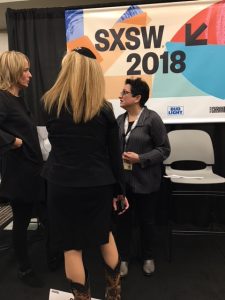“The Spirituality of Philanthropy,” SXSW Conference
One of the inspiring sessions I attended at the SXSW Conference focused on philanthropy as a spiritual practice.
In a previous post I acknowledged my ambivalence toward money. I wrote about hearing more negative than positive messages about money as I grew up. For example, I learned “the love of money is the root of all evil” (1 Timothy 6:10), and “it is easier for a camel to go through the eye of a needle than for someone who is rich to enter the kingdom of God” (Matthew 19:24). My family encouraged me to choose a vocation with the priority of helping people rather than making money.
But I’ve been realizing more and more the power of money to do good. And the organizations doing the most good often have the least money while organizations doing the most harm, like the National Rifle Association, have the most money. As co-chair of Equity for Women in the Church, I’ve understood the need for money to fund our good work of gender and racial equality, but I’ve found it difficult to ask for money.
So I attended this session at the SXSW conference, hoping to get inspiration and strategies. Caroline Boudreaux, founder of the Miracle Foundation, began by defining “philanthropy” as “the love of humanity.” She went on to say that everyone wants these three things:
- to love and be loved
- our families to be healthy, happy, and taken care of;
- to have a purpose and make a difference.
Caroline then told her personal story of having a great corporate job where she made a lot of money, but felt unfulfilled and discontented. This confused her because she had thought that once she was successful, she would be fulfilled and happy. She decided to quit her job and take a trip around the world for a year. In a remote part of India, she accidentally walked into an orphanage. “I was horrified by what I saw there,” she said. “110 filthy, bald, starving children.” A little girl, about a year and a half, put her head on Caroline’s lap, and she rocked her to sleep. When she took the baby to her room where there were thirty wooden beds with no mattresses, no pillows, no blankets—just hard wooden beds—she thought, “What am I doing? I’m partying around the world, and she doesn’t have anything.” In that moment everything changed for Caroline. Soon after, she founded the Miracle Foundation, dedicated to empowering orphans to reach their full potential. “It’s important to bring our best selves to the world, keeping our souls in place.”
Shamina Singh agreed with Caroline’s comment about bringing our whole selves to the world. “That for me means unlocking the power of purpose,” Shamina said. “It’s about being mission driven. For a company like MasterCard, or for any other company, your competitive advantage is your people. You want to be around colleagues who are showing up every day because they want to be there doing something. Everybody wants to feel that they belong. It’s important to be able to integrate our entire selves.” She talked about MasterCard’s creation of a foundation and encouragement of other companies to create independent, philanthropic foundations with 10% of the bottom line of the company. “We use assets of the company, not only money, but data and purpose-driven people, to make a social impact. It’s a good investment for the company and the right thing to do.”
Amy Lukken spoke about the greatest asset of companies being the people. When she found that heart and soul were missing in business, she started changing the culture of her company through a “joyologist” point of view, which she defined as “the study of love, joy, and happiness.” The way to counteract greed, she said, is through giving. “When we help people to give, set them up to give, we avoid the nasty, greedy corporate look of companies.” She commented on her belief in “radical generosity.”
Rabbi-Cantor Marie Betcher talked about ways people practice spirituality whether or not they’re affiliated with faith traditions in a formal setting. She cited the statistic that 35% of millennials are not affiliated with institutional religion. They and others are not getting their “souls fed in congregations,” but are finding their own spiritual pathways through work, music, art, and philanthropic organizations. Rabbi Betcher commented that the secularization of America could help people to stop seeing each other as Jews, Muslims, or Christians, and to start seeing each other as human. She also mentioned the good philanthropic work that interfaith organizations are doing, based on teachings about social justice, giving, and service that religious traditions have in common.
All the panelists then responded to this question: How does giving change us? Here are some of their responses:
Research indicates that when we give to someone else instead of ourselves, we reach three times the level of happiness. If giving becomes part of our sustained behavior, happiness becomes joy, which is deeper and lasts longer.
Giving is good for mental health.
Giving connects us to our purpose.
Giving gives us meaning.
Giving helps us use our power for good.
The panelists closed by talking about helping companies give their employees joy, purpose, and meaning through giving. They commented on how we do people a favor by giving them the chance to give and to make a difference they all want to make. “Innate in people is the desire to give, to make the world better. When employees have opportunities to choose the charities they believe in and want to support, those that connect with their purpose, then everyone wins.”
From my personal experience, we well as from observation of others and from research, I have long known the importance of meaning and purpose found through giving to others. As an oncology chaplain, I saw how meaning and purpose could add to quality of life and often length of life for people with cancer. Also, It was not new for me to hear the panelists talk about the happiness and joy that come from giving.
Attending this session reinforced what I’ve heard non-profit fundraisers say about helping people through asking them to donate to organizations they believe in. Even though it may still be hard for me to ask people for money, I felt challenged anew to help them find meaning and joy through giving to organizations that make a difference in the world. And I got the idea of approaching companies to add Equity for Women in the Church and Christian Feminism Today to their list of charities from which employees can choose to give.
I came away from this session with new messages about the power of money to contribute to the well-being of givers and receivers and the importance of helping people find ways to give.
You can listen to the recording of this session here.
Panelists:
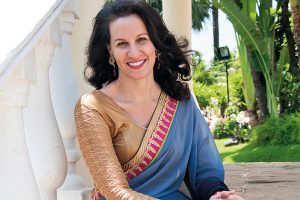
Caroline Boudreaux founded the Miracle Foundation in 2000, after she visited India for the first time. From the first moment she met a group of more than 100 orphaned children and witnessed their beautiful smiles and incredible potential, she committed her life to helping them realize that potential. Caroline was born and raised in Lake Charles, Louisiana, and attended Louisiana State University where she earned a Bachelor of Science in Psychology. Prior to her nonprofit work, she had a successful career in media advertising. For her achievements with the Miracle Foundation, Caroline was presented with the Hope Award in 2005 and the Impact Award in 2008. In 2009, she was invited to join the Young Global Leaders, a community of the World Economic Forum. She has been featured in various forms of media, including People.com, CNN and “One Peace at a Time,” a 2009 film by Turk Pipkin. In 2011, Caroline completed a prestigious course on Global Leadership and Public Policy for the 21st Century at Harvard Kennedy School.
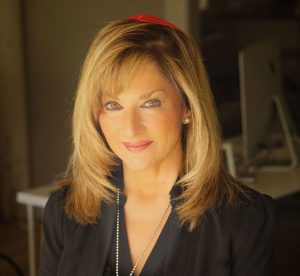
Rabbi-Cantor Marie Betcher, an Ordained Rabbi and Cantor, Police Chaplain and Opera Singer, serves as Consulting Rabbi for Congregation Chaverim B’Kavanah, Cedar Park/Northwest Austin. She served congregations across the country, gaining a wide and varied experience throughout her pulpit career. She serves the Austin Police Department and Cedar Park Police & Fire Departments as Chaplain. She is one of the very few female Rabbi/Cantors to serve as Police/Fire Chaplain in the country. She is very active in interfaith communities in Austin and surrounding cities. She is a Member of the Board of Directors for Interfaith Action of Central Texas, sits on the ChaplainUSA Board, and invited to the Lesbian Gay Peace Officers Association Board meetings. Rabbi Betcher has served on the American Conference of Cantors Executive Board, Chair of the ACC Caring Committee, and the ACC Budget Committee. She serves the Advisory Board of The Interfaith Arts Council (IAC). She was on staff for Life Long Learning Institute. She has served on the Austin Jewish Clergy Association, Interfaith Clergy Association, Bureau of Jewish Education, Faculty for Global Day of Jewish Learning at Dell Jewish Community Center, SULAM, Tapestry. Rabbi Betcher sang in Carnegie Hall and the Kennedy Center, and toured Sicily and England, among many other venues.
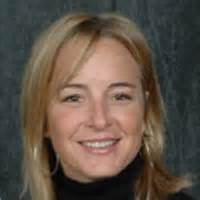
After 15 years as an executive at a Fortune 500 company Amy Lukken arrived at a truth which would shape the rest of her life and the lives of all those around her. People are the number one asset in any company AND managing that asset is the most complex component of any business. This revelation coupled with a seminal life event, inspired Amy to partner with Gallup’s world-renowned behavioral scientists. Together, paying special attention to what most intensely motivates and inspires people, they looked at “feeling-sets,” which included love and joy and its extraordinary impact on employee satisfaction, efficiency, productivity, and the bottom line. Amy has practiced the skills she learned as vice-president of a large corporation combined with her skills as a Certified Strengths Coach, and sees how natural and powerful it is when the focus stays on what’s good within people versus emphasizing their weaknesses and failures. Leadership takes on a new meaning as the company culture begins to thrive, thus creating a thriving bottom line. Currently co-creating a culture of love and joy at Tito’s Handmade Vodka as Chief Joyologist and Director of Philanthropy, Amy oversees all national and global philanthropic endeavors for the company.
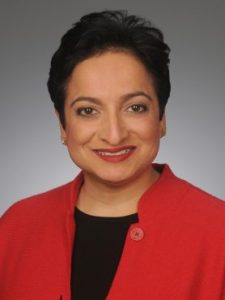
Shamina Singh is the Executive Vice President, Sustainability & President of the Mastercard Center for Inclusive Growth. In this role, she is responsible for advancing equitable economic growth and financial inclusion around the world. Previously, Shamina was Mastercard’s Global Director of Government Services and Solutions where she worked to digitize social subsidy programs in over 40 countries. In 2015, she was appointed by the President and confirmed by the U.S. Senate to a six-year term to the Board of the Corporation for National and Community Service. Prior to joining Mastercard, Shamina led Government and Public Affairs for Nike and spent five years with Citi’s Global Community Development Group. Over a 15-year career in the public sector, Shamina has held senior positions in the White House and the US House of Representatives.
